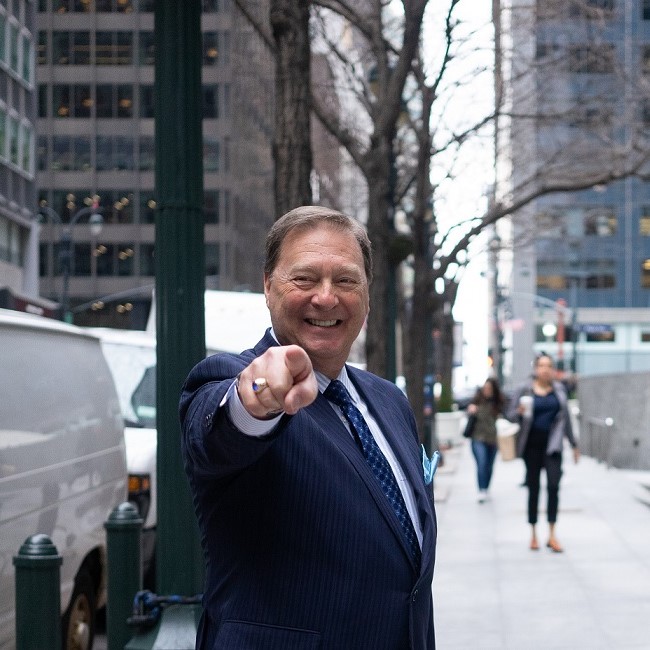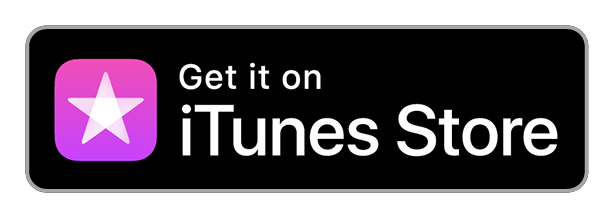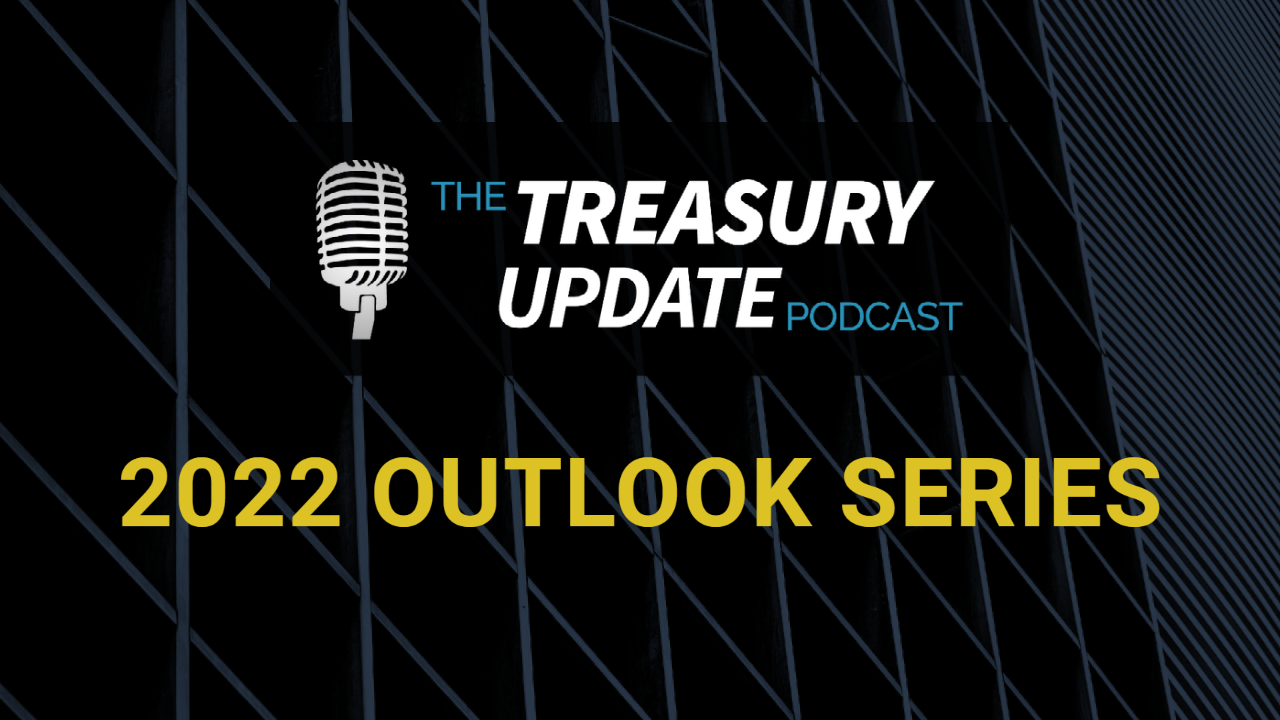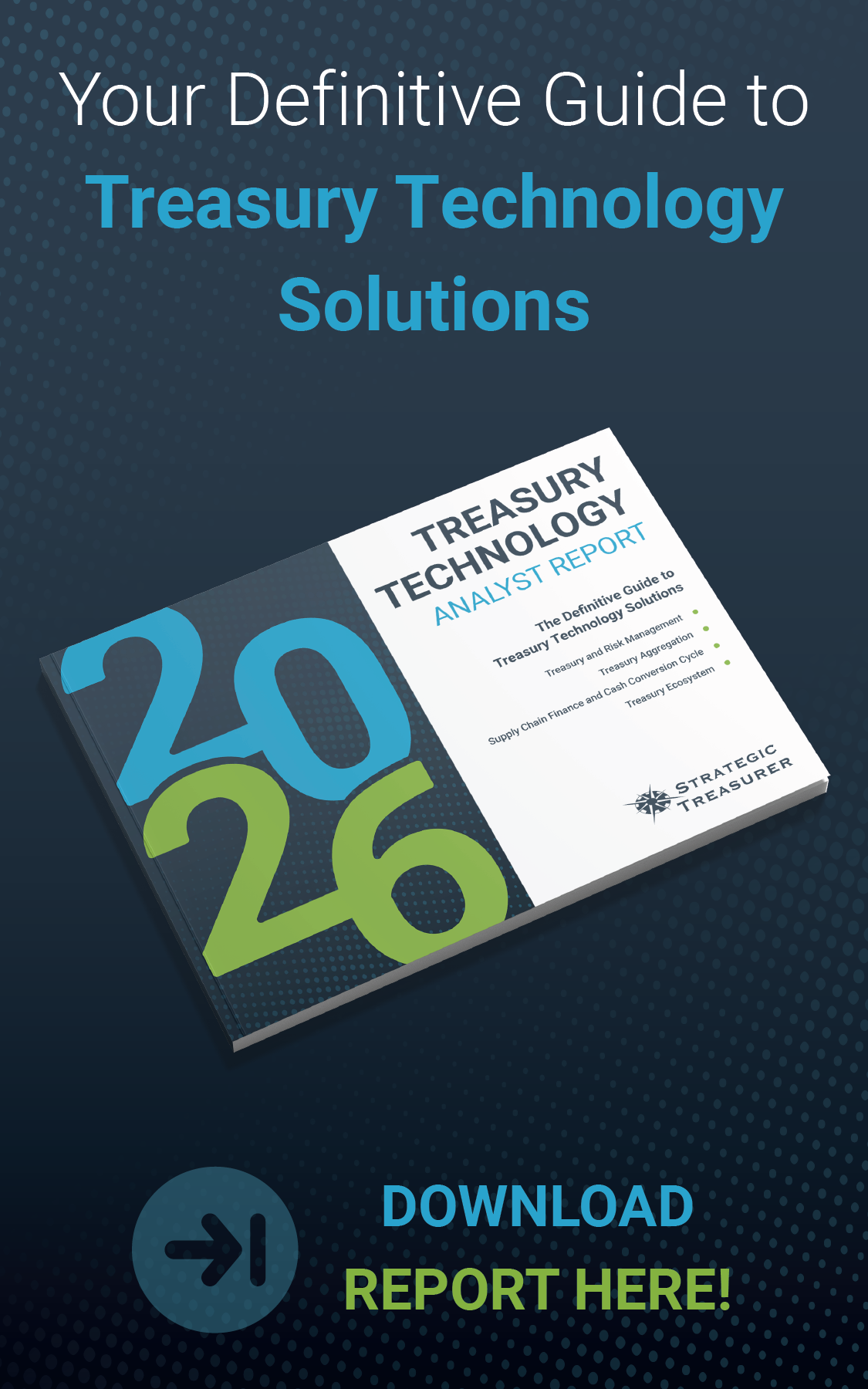
Episode 188
2022 Outlook Series: Challenges Acquiring and Keeping Treasury Leadership
Host:
Craig Jeffery, Strategic Treasurer


Speaker:
Allen Geller, Raines International


Episode Transcription - Episode 188: 2022 Outlook Series - Challenges Acquiring and Keeping Treasury Leadership
INTRO 0:03
Welcome to The Treasury Update Podcast, presented by Strategic Treasurer your source for interesting treasury news, analysis, and insights in your car at the gym, or wherever you decide to tune in.
On this episode of the 2022 Outlook Series, host Craig Jeffery sits down with Alan Geller, Managing Director of Raines International to discuss the global outlook on treasury talent. They discuss the challenges acquiring and keeping treasury leaders, market shifts with a view to staffing, hiring, and retention and more. Listen into this dynamic conversation to gain valuable insights on treasury talent for the year ahead.
Craig Jeffery 1:04
Welcome to The Treasury Update Podcast, Allen. It’s very good to have you on again.
Allen Geller 1:09
Craig, thank you for having me.
Craig Jeffery 1:11
We are in the midst of the 2022 Outlook Series and our topic is challenges acquiring keeping treasury leadership. In the news you hear a lot about the great resignation. You’re in tune to it. I mean, that’s kind of a general term. I think we want to know a little more specifics. Generally, before we get into treasury or maybe as a prelude to that. How bad is it about this resignation? When did it happen, if it did? And how is that at the professional level, particularly in finance? What are we learning there? What are you seeing in the statistics and in your discussions?
Allen Geller 1:49
Well, I think for the most part, the great resignation has not necessarily impacted what I will call the senior professional likes, treasures, assistant treasures, directors, managers those individuals with greater educational levels, various educational achievements are very much employed and there was not really any great resignation there. I think the great resignation was probably more at the hourly level than at the more senior compensation.
Craig Jeffery 2:27
We’ve clearly seen things about restaurants, people that are hourly, they’re having a hard time filling and go to the grocery store and it’s like, the deli is closed. The deli is closed at one of the largest grocery stores in the country like four different times I have been there. I don’t know if that’s COVID, the great resignation, it’s an impact. So, how are you seeing this at the different levels? What are some of the indicators? This is just by hourly versus salary, there are other elements.
Allen Geller 2:59
Well, I think it’s combination of two things. Certainly part of that great resignation has to do with COVID in the sense of people who are sick, when people become sick, they can no longer work. I also think a significant part of that is in the service industry, in particular. But I also believe it’s the people who are seeming to be the ones that are not there, are the hourly. And just from a statistical perspective, the Bureau of Labor Statistics has a font of information, as you would expect. One of the things I follow on that is employment status of the civilian population 25 years or older by educational attainment. So, the example I’ll give you in December of 21, a month ago, 45% of and so we’re talking initially about people with less than high school diploma, 45% of that group is participating in the labor market. Of that group the unemployment rate is 5.9%. The interesting thing is if you go to the high school level, with high school degree 55% of that labor force is participating and the unemployment rate is 4.5% now doesn’t sound like a lot between 5.9 to 4.5, but that’s a 23% differential. And if you drop down to some college 62% almost 63% of the people are participating in the employment market. And the unemployment rate of that group is 3.3%.
Craig Jeffery 4:52
I am detecting a pattern here.
Allen Geller 4:55
Right, that’s a 44% differential from the no high school. So, just think about it this way. The median earnings of a person with a bachelor’s degree over the course of their 40 years of working, they will earn roughly $2.8 million. And this again, is from Bureau of Labor Statistics. That’s 75% more than high school only. So, when you talk about the great resignation, it’s not the people with the MBA. So, just as a comparative, that group of bachelor’s degree or higher, the unemployment rate for the same time frame was 1.9%. That’s a 66% differential between no high school degree. So, what I’ll suggest and from my experience, anecdotal experience from the groups that I work with, I work do a lot of work in the financial space, but also the treasury space, specifically, there is very little unemployment at those levels, and people are looking to hire more.
Craig Jeffery 6:11
So, low unemployment looking to hire more. The next question I was going to ask you sort of answered part of that. It’s like what does the market look like? But I know you can go into some more detail and calibrate how we should think about that. Has this changed over time, or how has this changed over time? And then maybe you could reflect on what does this do with our efforts at retention? How we hire especially for looking for more positions than existed before? Maybe you can talk to that?
Allen Geller 6:41
Well, the interesting thing is Zoom, while it has created panel interviewing, has shortened the cycle for interviewing, because there’s no travel requirements. And the specific example I’ll give you is an organization that I just completed a search for, they hired their new treasurer because the incumbent, retired and essentially, there were three senior level executives in this organization that needed to be met by the candidate. They were in the Midwest and the candidate was in the far west. He was prepared to relocate to the Midwest. He interviewed on Thursday, Friday and Monday. One of those each day, if we had done that, in person, it would have taken three weeks to get it done. Because he was working remotely, he can interview whenever they were available. They made the logistic process infinitely easier. The other part of it that has developed since this Zoom, age, if you will, is that there’s more people in the interview process, what they’re doing in panels. So, candidate might interview for an hour and have six people listening to their answers. The companies that are doing this well, where they’ll interview multiple candidates have established a strategy and a program and specific questions that are asked by a specific person so that everybody gets the same kind of process. What it does is it prevents the candidate from having to tell the same story six times because six people were saying it to the individual at once. The companies that do this hiring process very well have established a protocol. There’s a beginning, a middle and an end to each interview. Each candidate each one of the panelists will ask one or perhaps two questions, and it will always be the same person asking the same question to different candidates. The important part of this type of interview process is that and again, it’s the companies that are doing this well, they have a wrap up session for 15 minutes directly after the interview process has ended. While it’s fresh, when you have six people being interviewed, we have six panels, interviewing people, and each one gets a half hour an hour, whatever it might be. Getting them together at the same time is going to be very difficult to teach you on the six panels. Has a half hour interview, you know you’re talking start at nine ended at 12:00. And then 12:15 everybody’s got to get together but they’re not together necessarily. So, I think the Zoom process, the Zoom age has made the logistics a little bit easier.
Craig Jeffery 10:00
So these interviews are lasting the half hour to an hour with six panelists interviewing? So they’re, they’re moving along quickly.
Allen Geller 10:08
Yes, there’s a lot less wasted time. And because it’s programmed, everybody knows what they’re asking and how to get it done. And how effectively to ask the question. You ask a question, to gather specific piece of information. If you don’t get it, there’s a follow up question. And then it moves to the next person. And because you’ve got the list of questions out there and everybody’s doing, there’s a routine that develops among the panelists.
Craig Jeffery 10:36
So, there’s this, you know, web meeting interviewed by panel, shortened cycle. Is this this truncating the time that it takes to have offers out and people to accept. Are there ripple effects or other changes with remote work or how is this impacting other areas of the market? You’ve already said it’s like less than 2% unemployment.
Allen Geller 11:02
Which by the way is full employment by any economist definition, 2% is full employment.
Craig Jeffery 11:11
Let’s say searches you’re doing–how is this compressing the time cycle? What’s changing over time, and I guess over the last couple of years have become the Zoom or the Team’s interview cycle. Did that change during COVID? And what are the ripple effects?
Allen Geller 11:31
When the economy is not doing well. I think companies kind of slipped back into what I’ll called defensive hiring. Because the economy is not well, people are more concerned about their job security, and therefore what they figure is, more people should interview this candidate, which spreads the risk of, well, I didn’t hire a bad candidate, we hired a bad candidate. So, I call that defensive as opposed to be proactive in hiring the best candidate, in a lot of cases in a down economic side of they’ll hire the least offensive candidate. Because, you know, a lot of people just are concerned about their own job. So, 100%, we’re almost two years into this Zoom cycle, if you will. I mean, my last day in Manhattan for work was March 13, 2020. We’re now in the first quarter of 22. And we’re still not working in Manhattan. There’s a variety of reasons for it, but at the end of the day, we’ve gotten much better at doing this than we were when it started out. You know, and people are much more comfortable with it, and understand how to do it better. And goodness, there’s kazillion tutorials on how to do this now. But a lot of this was already in process. Many companies at lower levels they’ll send you an email which will give you a link towards a video interview. And you’re actually being given a question and then you’re being recorded on the answer. And this was already in progress in 2019. So, we’ve been moving in this direction for a while, where, you know, we’re getting away from a lot of the interpersonal relationships on an interview. But it’s still the same thing. You know, the big issue that we’re now folks face is, you know, unconscious bias and people hiring the same people all the time. You know, there’s a big part of what’s going on right now that that is, you know, focused on diversity, equity and inclusion. That’s a story for another a day, by the way.
Craig Jeffery 14:02
Interesting comments, you know, I guess I guess I want to ask you too about this. What’s this compression doing? If it normally would take, like, that example you gave, might take three weeks for the person to be able to talk to all three of the top executives. And now it’s been done in three days. What does that mean? If someone’s looking at five candidates or two candidates, what does that do for the hiring company? And how about for the employees who’s looking for what is what’s going on there?
Allen Geller 14:33
Well, the process is being made shorter. It requires the hiring manager to be more decisive. It also helps individuals see the process much more quickly. Sometimes, you know, you cannot put a 2018 mindset in today in 2022, where candidates might go through a process, but it depends on the hiring people. I’ll give you a perfect example. We did a search for a vice president of mission related investing for an organization. Candidate interviews with the CH bit again along with the CHRO on Monday. She came back and we need to get him in on Wednesday. On Wednesday, with three Zooms. He met the CEO he met a board member, and he met the CFO at nine, twelve, one something like that. I got an email from the CEO at about three saying can we talk this afternoon? And this was the day before Thanksgiving. Okay. And I said absolutely. You know, I’m here to help you out and she said good. We talked at four o’clock. At 4:30 I made the candidate an offer. The entire process took three days. Now, the caveat is that A) the CEO knew what she wanted to hire, they interviewed a few people. This was the person… this is the first person she actually interviewed, CHRO and interviewed three candidates. This is the first one she passed through. She said, “This is what I want”. Now, you know I can pat myself on the back and say, “Oh. I did a great job.” But it’s a combination of things. The CEO knew what she wanted to hire and wasn’t afraid to make a decision.
Craig Jeffery 16:36
So, if 2018 was a more in person, non-Zoom defensive mode, what is 2022?
Allen Geller 16:46
How about TBD?
Craig Jeffery 16:50
What was 2021?
Allen Geller 16:53
2021 was a wonderful year. We did about 40% more searches in 21 than we did in 20. And the way that 22 is starting off, I would not be surprised to see us do you know a significantly greater number 22 than we did in 21. Everybody hears about these inflation numbers and all these other things and it’s artificial. My opinion, it’s artificial. The numbers are there. But the cause of the numbers being there can be solved without a whole lot of economics. As the supply chain clears up, supply will equal demand and then an equilibrium will be there. Right now. I submit to you because in really good shape. People are paying huge prices for stuff because there’s more money.
Craig Jeffery 17:50
That’s probably you know, that’s a topic for another day too. That would be a good one that I want to keep it on the employment you know, I’ll go down a rabbit trail with you, Allen. So, as we think about companies that are hiring, you say more companies are trying to hire. The labor market is very tight. There may have been a great resignation in the space that we’re talking about from early but what advice you give company leadership that needs to hire for 2022? What are the principles that we need to be looking at pay more attention to than we did four years ago or even two years ago?
Allen Geller 18:28
One of the prime differences that we’re seeing today as opposed to 2018 are candidates are receiving more than one offer at the same time.
Craig Jeffery 18:38
This is from the compressed cycle are just people are looking more places?
Allen Geller 18:42
No more companies are going after the same people. So, you know if you get a, you know, a treasurer or CFO that’s going to do an IPO. Well, you can’t…the real key is you can’t wait around you can’t take the time to do this. You need to move as quickly as you can. Because you know I’ve always operated on the premise if I can find somebody a potential candidate who if somebody else could find them as well. So, you wind up with in competition for candidates. That to me, is a towel on the economy’s in good shape. Because companies are hiring the same people.
Craig Jeffery 19:29
Yeah, that’s pretty that’s pretty interesting that like there was a note I can remember one very stark item. We had a… I was having a meeting with a very senior level person. And they’re like, I’ve got to jump off for a bit. Can we come back at this time? I’ve got to get I got approval for to make an offer. I’ve got to get the offer out there before I lose the person. And I was like, well 20 minutes will make a difference like in my head that’s what I was thinking of, you know? And so that fits into your anecdotes and storyline here that it’s like bears. When they’re in play. They’re not in play for very long.
Allen Geller 20:08
Right. You know, there’s this old physics axiom. A body at rest tends to stay at rest, a body in motion tends to be in motion. Now, I can put the body into motion, and I can’t tell you why but invariably, somebody else finds that body that’s now in motion. And there’s going to be a competition for it and being decisive is certainly for that group of people is certainly somebody that that somebody wants to feel that way the company a wants them, is prepared to move quickly, and knows what it wants. Ambiguity and lack of information are the worst possible thing that a company can make itself seem like. So, when you’re talking about hiring people, do it now. Don’t wait.
Craig Jeffery 21:05
I think you’ve used the term defensive and decisive so what we need to move from your suggestion is that for many of these roles move from being defensive to decisive.
Allen Geller 21:17
Or being proactive as opposed to reactive.
Craig Jeffery 21:20
Well, you’ve got to pick one theme, Allen. It’s got to be either defensive or reactive.
Allen Geller 21:28
Yeah, but, it’s, you know, is it not true? Because, Craig, there’s a variety people are different. And, you know, some companies want to be in the top quartile. Some companies want to be in the middle. Some companies want to be at the 75th percentile. I have a client that they’re very keen about it. We want to be at the 55th percentile why beats the hell out of me, but that’s what they want. So that’s what they’re going to pay for. But they know what they want, and they’re prepared to do something about it. The issue really comes down to are you going to take the action. You know, there’s a commercial on for crypto.com
Craig Jeffery 22:16
Oh, boy, here we go.
Allen Geller 22:18
Fortune, favors the brave, right? Or it’s also aligned from Aida the Broadway musical, but the point is, if you’re going to do something, do it, don’t make the decision to sit there and not make a decision. Douglas McGregor and his Blackbox theories and you know, you can make a decision to make a decision, you can make a decision not to make a decision. You can do it pro not to make a decision or con. Those are the three options you get. If you sit there in the middle, you’re going to be the one that loses. So, in order to hire, in order to retain you have to be proactive.
Craig Jeffery 23:06
I like that. So you’re saying it’s not one of the other you gotta have both reactive.
Allen Geller 23:12
No, no, I’m saying I’m saying I’m saying there’s all kinds of different places. Some places say hey, listen, we’ve got this great opportunity, and we’re gonna wait. And those companies that are going to wait, invariably are going to lose their top tier candidates. But maybe they don’t want to pay the top tier candidates. Like I suggested to you. Some companies want to be in different places in the pay cycle. You know, the company is going to pay the 25th percentile, lower 25th percentile, is not going to get the best candidates. You know, I have this philosophy that big companies hire better people, pay more money, and it’s a generality. With that said, the companies that are paying the top dollars, the McKinsey’s, the Banes, the BCGs, the Goldman Sachs the Morgan Stanley’s you’re going to get the best talent because they’re going to pay the most money. So, what there’s other companies that maybe it’s a distribution company, and the margins are 1% and they’re not making a lot of money. So, are they going to pay the same price as a Goldman Sachs’s? So, they’re not going to get the same person as the Goldman Sachs would get. That’s where the differential is, depending upon who you want, the people at the top of the ladder are generally the ones that get picked off first. You know, if you go in take it all the way back to college graduations. So, the kids that are summa or magnum cum laude, they’re going first, they’re getting the interview before the other people because everybody wants to hire smart. How do you prove you’re smart? Well, you graduated summa cum laude, you had a 3.9 GPA. I don’t care if you went to Miami Dade junior college, you get a 4.0, you get a 4.0. So let me reverse it. Let me ask you a question, Craig. Would you have rather hire somebody who’s really smart or somebody who’s average? And you’re gonna say to me It depends upon the job, Allen.
Craig Jeffery 25:10
No, I think for most, most positions, I would much rather hire someone who’s smart. Not just school knowledge but able to solve problems or work on things and so some of the some of the smarts are different. I guess. There’s the, you know, the creative, smart how to like, build something or do something. And I want you need people smart for those others are technically smart. Others are really smart about making processes better. But I don’t usually want to hire less smart. I want to hire the skills and the smart so yeah, I guess I’m answering like you it’s like, yeah, I want both of those depending on the role.
Allen Geller 25:54
Right. But when that and when that person shows up, and you say boy, this person has the stops. Are you going to wait around for days?
Craig Jeffery 26:02
No. No, we turn it around fairly quickly. And once you’ve blocked in someone that’s… especially if you’re a little farther than the process, you look at some that aren’t a fit, then you find a fit like that the first person’s pretty good, you might talk to some more because then you have this measurement off of what’s in the market today. And we’ve had times where we’ve been out jobs, the market, we’ve had 150 people apply, and at least 20 of them are well qualified and good and other ones where it’s like, it’s been out there for a month, and we’ve had one who’s questionable.
Allen Geller 26:42
What my point to you is, when you’re looking for that individual that hits the top lines on both of those categories that you’ve decided are important. You can’t afford to wait around. The reason you will quickly. You don’t want to lose that individually.
Craig Jeffery 26:58
Yeah, they’re fit why drag it out too?
Allen Geller 27:02
Right. So, you are somewhat of an anomaly. You have a business; you’re coming at it from a business perspective. And you’re saying, hey, we got to get this done. Gotta get done now cuz you’re a service provider. Like I’m a service provider. The hiring manager who’s proactive, who understands what they need to do is the one that is going to be able to get that top tier talent.
Craig Jeffery 27:29
And I like it, some really good points there, Allen. As we draw to a close this discussion about acquiring and keeping treasury leadership and what are the challenges there any final thoughts? Either extra points of emphasis or something else that we should be thinking about?
Allen Geller 27:49
Don’t be afraid. Don’t necessarily hiring your own image and recognize that talents not going to just show up on your doorstep to show up on your doorstep. Somebody’s going to have to bring it to you.
Craig Jeffery 28:06
Excellent, Allen and thank you so much for all your insights.
OUTRO 28:16
You’ve reached the end of another episode of The Treasury Update podcast. Be sure to follow Strategic Treasurer on LinkedIn, just search for Strategic Treasurer. This podcast is provided for informational purposes only, and statements made by Strategic Treasurer LLC on this podcast, are not intended as legal, business, consulting, or tax advice. For more information, visit and bookmark strategictreasurer.com.
Related Resources
#TreasuryFAQ – YouTube Playlist
Check out our YouTube playlist covering many frequently asked questions in treasury!






